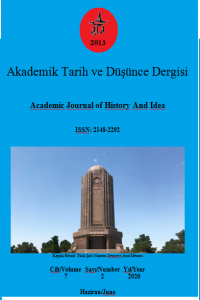СРАВНИТЕЛЬНАЯ ОЦЕНКА ВОПРОСА О МЕСТЕ АЗЕРБАЙДЖАНА В РОССИЙСКО-СЕФЕВИДСКИХ ДОГОВОРАХ ПЕРВОЙ ПОЛОВИНЫ XVIII В
В международных договорах XVIII – нач. XIX вв. наглядно отражаются этапы развития внешней политики России и её последствия. Отсюда, особую актуальность приобретает тема изученности внешней политики России в Азербайджане, как и на Кавказе в целом в указанный период. С этой точки зрения, историографический анализ договоров, заключённых в первой половине XVIII в. между Россией и Сефевидским государством, способ¬ствует осмыслению истоков внешней политики России в данном регионе, что позволяет выявить степень разработки исторических корней ряда геопо¬литических процессов современности. Одностороннее, необъективное изуче¬ние этих вопросов воспрепятствует правильной оценке современных международных конфликтов.В предлежащей статье предпринята попытка историографического анализа работ по изучению российско-сефевидских договоров первой половины XVIII в., сыгравших определённую роль в судьбе азербайд¬жанского народа, с проведением сравнительной оценки изучения вопроса о месте Азербайджана в этих договорах советскими и современными исследователями. Рассматривается влияние официальных советских догм на изучение данного вопроса историками этого периода, а также раскрывается новый деидеологизированный подход современных исследователей к изучению российско-сефевидских договоров первой половины XVIII в.
Comparative Assessment of the Question About the Place of Azerbaijan in the Russian-Sefevid Treaties of the First Half of the 18th Century
International treaties of the 18th - beginning 19th centuries clearly reflect stages of development of Russia’s foreign policy and its consequences. Hence, the study of the topic of Russia’s foreign policy in Azerbaijan, as well as in the Caucasus as a whole during the mentioned period, is of particular relevance. From this view point, historiographic analysis of the treaties concluded in the first half of the 18th century between Russia and the Sefevid state, contribute to the understanding of the origins of Russia’s foreign policy in this region, which allows identifying the degree of develop-ment of the historical roots of a number of geopolitical processes of the present. One-sided, biased study of these issues prevents a proper assessment of contemporary inter-national conflicts. In the article is made attempt to historiographic analysis of studies of Russian-Sefevid treaties of the first half of the 18th century, which played a definite role in the fate of the Azerbaijani people, with a comparative assessment of the study of the issue of Azerbaijan’s place in these treaties by Soviet and modern scholars. The influence of official Soviet dogmas on the study of this issue by historians of this period is examined, and also a new de-ideologized approach of modern researchers to the study of Russian-Sefevid treaties of the first half of the 18th century is revealed.
___
- OMER, K., Yujnıy Kafkaz v politike Tursii i Rossiyi v postsovetskiy period. Moskva: Russkaya panorama, 2004.
- RAQIMOV, Q., İz istorii azerbaycano-russkix diplomatiçeskix otnoşeniy vo vtoroy polovine XVIII – v naçale XIX veko, Baku, 1997.
- SALAMOVA, N.A., ‘’Kavkaz i Krım v russko-tureskix otnoşeniyax ot Reştskoqo doqovora do Qandjinskoqo traktata (1732-1735 qq.)’’, Vostoçnıy arxiv, Moskva, №16, (2007): 11-15.
- SOTAVOV, N.A., Severnıy Kavkaz v russko-iranskix i russko-tureskix otnoseniyax v XVIII v., Moskva: Nauka, 1991.
- SOTAVOV, N.A. Krax «Qrozı Vselennoy» v Daqestane, Maxachkala: İD «Epoxa», 2000.
